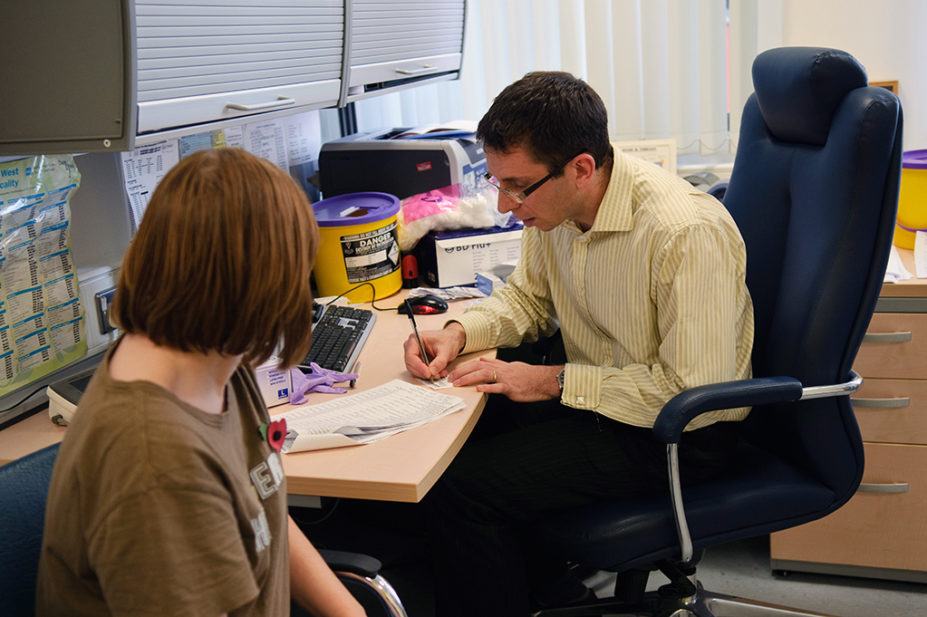
Stephen Barnes/Medical / Alamy Stock Photo
The UK government has said it will tackle “decades of gender health inequality”, including the establishment of a UK-wide menopause taskforce to further investigate how women going through the menopause can be better supported by healthcare professionals.
A “vision document”, published by the Department of Health and Social Care (DHSC) on 23 December 2021, follows the analysis of almost 100,000 responses to a call for evidence highlighting the need for system-wide changes across the healthcare system in England.
The document precedes the upcoming ‘Women’s Health Strategy‘, which aims to set out a new agenda on women’s health, with women’s voices at the centre, which is due to be published government in spring 2022.
According to the document, ‘Our Vision for the Women’s Health Strategy for England’, responses to the call for evidence highlighted that 80% of women felt they were not listened to by healthcare professionals and many women believed compulsory training for all healthcare professionals on women’s health was needed to ensure their needs were met.
The vision document covers a range of areas, including menstrual health, fertility, mental health and the menopause.
It adds that respondents reported that their symptoms were not taken seriously or recognised as the menopause, and that there were difficulties in accessing hormone replacement therapy (HRT), with some GPs reluctant to prescribe it.
Respondents also called for more information on the menopause and on treatment options, in particular in cases where HRT is not suitable.
The vision document does not go into specifics, but says the government will implement recently announced reforms, including measures to reduce the cost of and improve access to HRT and the establishment of the UK Menopause Taskforce, which it says will consider the right support for women, such as “education and training, workplace policies and peer groups for menopausal women”.
Maria Caulfield, minister for women’s health, said in a statement on 23 December 2021: “The responses from the call for evidence were in many ways as expected, particularly with regards to women’s priorities, but in some places the revelations were shocking.
“It is not right that over three quarters of women feel the healthcare service has not listened. This must be addressed.
“Many of the issues raised require long-term system wide changes, but we must start somewhere. I am proud to publish our vision for women’s health. It is the first step to realising our ambition of a healthcare system which supports women’s needs throughout their lives.”
Christina Nurmahi, women and newborn care group lead pharmacist at University Hospital Southampton NHS Foundation Trust said that better education around women’s health would go “a long way” to improving the present picture and that pharmacists were well placed to signpost women to information and resources as they become available.
“Specialist pharmacists in women’s health are particularly well placed to initiate discussions within the workplace to support female staff, getting involved with the development of workplace policies. There is also scope for specialist pharmacists to get involved across the sectors to develop adequate service provisions such as menopause clinics and education of GPs.
Nurmahi added that the “current climate” had highlighted the lack of access to suitable HRT and prescribers being unsure of what options are available.
“Pharmacists are well placed to keep prescribers informed of availability of stock. The scope for developing our role is vast if we are prepared to step out and engage with our colleagues and work collaboratively to improve services to women across their life course.”
In a position statement on women’s health, published on 19 July 2021, the Royal Pharmaceutical Society called for more research data on how different medicines work in women and improvements in how clinicians “speak with and listen to women”.
At the time, Claire Anderson, president of the RPS, said that pharmacists can “help reduce stigma and improve women’s awareness of what is normal and what is not, covering issues such as endometriosis, excessive menstrual bleeding, menopause and incontinence”.
Read more: Community pharmacies to provide women’s health services in Scotland


